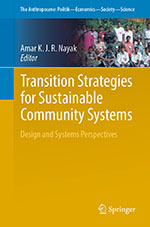APESS
Vol 26 |
Nayak, Amar KJR (Ed.): Transition Strategies for Sustainable Community Systems. Design and Systems Perspectives (Cham: Springer International Publishing, 2019).
ISBN: 978-3-030-00355-5 (Softcover)
ISBN: 978-3-030-00356-2 (EBook)
Doi: 10.1007/978-3-030-00356-2_ (add chapter no.)
Order this book on Springer Website
|

|
- Provides a systems perspective to building sustainable community systems at the lowest governance unit
- Gives insight on possible perspectives towards building sustainable community systems within a particular district of any country across the world
- Offers a fresh perspective to design thinking for optimizing internal design consistencies
This book presents five critical dimensions on relationships, institutions, production, organisation, and governance from design and systems perspectives for the systematic transition of unstable and vulnerable communities across the world to sustainable community systems.
- The first section discusses features of relationships and processes to deepen cooperation and trust within a community.
- The second section examines institutions within and outside a district to foster synergy across institutions within a district and to minimise negative externalities on local communities within a district.
- The third section deals with food production systems that are nature-friendly, resilient, efficient and sustainable.
- The fourth section discusses the design of producer organisations that can graduate to become sustainable community enterprise systems.
- The fifth section focuses on community governance that can facilitate decentralised, participatory, transparent and democratic local governance systems.
|